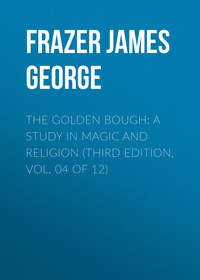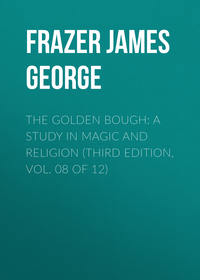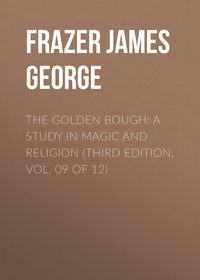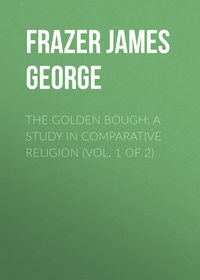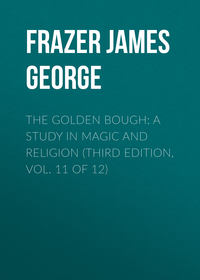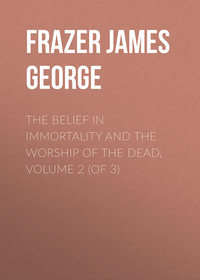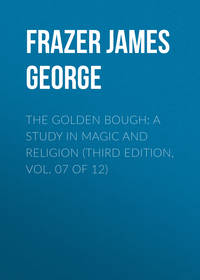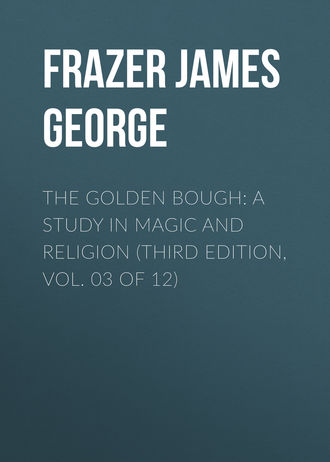 полная версия
полная версияThe Golden Bough: A Study in Magic and Religion (Third Edition, Vol. 03 of 12)
A similar custom has modified languages in Africa, Buru, New Guinea, the Caroline Islands, and the Nicobarese.
The Basagala, a cattle-breeding people to the west of Uganda, cease to use a word if it was the name of an influential person who has died. For example, after the death of a chief named Mwenda, which means “nine,” the name for the numeral was changed.1369 “On the death of a child, or a warrior, or a woman amongst the Masai, the body is thrown away, and the person's name is buried, i. e. it is never again mentioned by the family. Should there be anything which is called by that name, it is given another name which is not like that of the deceased, For instance, if an unimportant person called Ol-onana (he who is soft, or weak, or gentle) were to die, gentleness would not be called enanai in that kraal, but it would be called by another name, such as epolpol (it is smooth)… If an elder dies leaving children, his name is not buried for his descendants are named after him.”1370 From this statement, which is translated from a native account in the Masai language, we may perhaps infer that among the Masai it is as a rule only the childless dead whose names are avoided. In the island of Buru it is unlawful to mention the names of the dead or any words that resemble them in sound.1371 In many tribes of British New Guinea the names of persons are also the names of common things. The people believe that if the name of a deceased person is pronounced, his spirit will return, and as they have no wish to see it back among them the mention of his name is tabooed and a new word is created to take its place, whenever the name happens to be a common term of the language.1372 Thus at Waga-waga, near the south-eastern extremity of New Guinea, the names of the dead become taboo immediately after death, and if they are, as generally happens, the names of common objects, new words must be adopted for these things and the old words are dropped from the language, so long at least as the memory of the dead survives. For example, when a man died whose name Binama meant “hornbill,” a new name ambadina, literally “the plasterer,” was adopted for the bird. Consequently many words are permanently lost or revived with modified or new meanings. The frequent changes of vocabulary caused by this custom are very inconvenient, and nowadays the practice of using foreign words as substitutes is coming more and more into vogue. English profanity now contributes its share to the language of these savages.1373 In the Caroline Islands the ordinary name for pig is puik, but in the Paliker district of Ponape the pig is called not puik but man-teitei, or “the animal that grubs in the soil,” for the word puik was there tabooed after the death of a man named Puik. “This is a living instance showing how under our very eyes old words are dropping out of use in these isolated dialects and new ones are taking their place.”1374 In the Nicobar Islands a similar practice has similarly affected the speech of the natives. “A most singular custom,” says Mr. de Roepstorff, “prevails among them which one would suppose must most effectually hinder the ‘making of history,’ or, at any rate, the transmission of historical narrative. By a strict rule, which has all the sanction of Nicobar superstition, no man's name may be mentioned after his death! To such a length is this carried that when, as very frequently happens, the man rejoiced in the name of ‘Fowl,’ ‘Hat,’ ‘Fire,’ ‘Road,’ etc., in its Nicobarese equivalent, the use of these words is carefully eschewed for the future, not only as being the personal designation of the deceased, but even as the names of the common things they represent; the words die out of the language, and either new vocables are coined to express the thing intended, or a substitute for the disused word is found in other Nicobarese dialects or in some foreign tongue. This extraordinary custom not only adds an element of instability to the language, but destroys the continuity of political life, and renders the record of past events precarious and vague, if not impossible.”1375
The suppression of the names of the dead cuts at the root of historical tradition.
That a superstition which suppresses the names of the dead must cut at the very root of historical tradition has been remarked by other workers in this field. “The Klamath people,” observes Mr. A. S. Gatschet, “possess no historic traditions going further back in time than a century, for the simple reason that there was a strict law prohibiting the mention of the person or acts of a deceased individual by using his name. This law was rigidly observed among the Californians no less than among the Oregonians, and on its transgression the death penalty could be inflicted. This is certainly enough to suppress all historical knowledge within a people. How can history be written without names?”1376 Among some of the tribes of New South Wales the simple ditties, never more than two lines long, to which the natives dance, are never transmitted from one generation to another, because, when the rude poet dies, “all the songs of which he was author are, as it were, buried with him, inasmuch as they, in common with his very name, are studiously ignored from thenceforward, consequently they are quite forgotten in a very short space of time indeed. This custom of endeavouring persistently to forget everything which had been in any way connected with the dead entirely precludes the possibility of anything of an historical nature having existence amongst them; in fact the most vital occurrence, if only dating a single generation back, is quite forgotten, that is to say, if the recounting thereof should necessitate the mention of a defunct aboriginal's name.”1377 Thus among these simple savages even a sacred bard could not avail to rescue an Australian Agamemnon from the long night of oblivion.
Sometimes the names of the dead are revived after a certain time. The American Indians used to bring the dead to life again by solemnly bestowing their names on living persons, who were thereafter regarded as reincarnations of the dead.
In many tribes, however, the power of this superstition to blot out the memory of the past is to some extent weakened and impaired by a natural tendency of the human mind. Time, which wears out the deepest impressions, inevitably dulls, if it does not wholly efface, the print left on the savage mind by the mystery and horror of death. Sooner or later, as the memory of his loved ones fades slowly away, he becomes more willing to speak of them, and thus their rude names may sometimes be rescued by the philosophic enquirer before they have vanished, like autumn leaves or winter snows, into the vast undistinguished limbo of the past. This was Sir George Grey's experience when he attempted to trace the intricate system of kinship prevalent among the natives of western Australia. He says: “It is impossible for any person, not well acquainted with the language of the natives, and who does not possess great personal influence over them, to pursue an inquiry of this nature; for one of the customs most rigidly observed and enforced amongst them is, never to mention the name of a deceased person, male or female. In an inquiry, therefore, which principally turns upon the names of their ancestors, this prejudice must be every moment violated, and a very great difficulty encountered in the outset. The only circumstance which at all enabled me to overcome this was, that the longer a person has been dead the less repugnance do they evince in uttering his name. I, therefore, in the first instance, endeavoured to ascertain only the oldest names on record; and on subsequent occasions, when I found a native alone, and in a loquacious humour, I succeeded in filling up some of the blanks. Occasionally, round their fires at night, I managed to involve them in disputes regarding their ancestors, and, on these occasions, gleaned much of the information of which I was in want.”1378 In some of the Victorian tribes the prohibition to mention the names of the dead remained in force only during the period of mourning;1379 in the Port Lincoln tribe of South Australia it lasted many years.1380 Among the Chinook Indians of North America “custom forbids the mention of a dead man's name, at least till many years have elapsed after the bereavement.”1381 In the Twana, Chemakum, and Klallam tribes of Washington State the names of deceased members may be mentioned two or three years after their death.1382 Among the Puyallup Indians the observance of the taboo is relaxed after several years, when the mourners have forgotten their grief; and if the deceased was a famous warrior, one of his descendants, for instance a great-grandson, may be named after him. In this tribe the taboo is not much observed at any time except by the relations of the dead.1383 Similarly the Jesuit missionary Lafitau tells us that the name of the departed and the similar names of the survivors were, so to say, buried with the corpse until, the poignancy of their grief being abated, it pleased the relations to “lift up the tree and raise the dead.” By raising the dead they meant bestowing the name of the departed upon some one else, who thus became to all intents and purposes a reincarnation of the deceased, since on the principles of savage philosophy the name is a vital part, if not the soul, of the man. When Father Lafitau arrived at St. Louis to begin work among the Iroquois, his colleagues decided that in order to make a favourable impression on his flock the new shepherd should assume the native name of his deceased predecessor, Father Brüyas, “the celebrated missionary,” who had lived many years among the Indians and enjoyed their high esteem. But Father Brüyas had been called from his earthly labours to his heavenly rest only four short months before, and it was too soon, in the phraseology of the Iroquois, to “raise up the tree.” However, raised up it was in spite of them; and though some bolder spirits protested that their new pastor had wronged them by taking the name of his predecessor, “nevertheless,” says Father Lafitau, “they did not fail to regard me as himself in another form (un autre lui-même), since I had entered into all his rights.” 1384
Mode of reviving the dead in the persons of their namesakes among the North American Indians.
The same mode of bringing a dead man to life again by bestowing his name upon a living person was practised by the Hurons and other Indian tribes of Canada. An early French traveller in Canada has described the ceremony of resurrection as it was observed by a tribe whom he calls the Attiuoindarons. He says: “The Attiuoindarons practise resurrections of the dead, principally of persons who have deserved well of their country by their remarkable services, so that the memory of illustrious and valiant men revives in a certain way in others. Accordingly they call assemblies for this purpose and hold councils, at which they choose one of them who has the same virtues and qualities, if possible, as he had whom they wish to resuscitate; or at least he must be of irreproachable life, judged by the standard of a savage people. Wishing, then, to proceed to the resurrection they all stand up, except him who is to be resuscitated, to whom they give the name of the deceased, and all letting their hands down very low they pretend to lift him up from the earth, intending by that to signify that they draw the great personage deceased from the grave and restore him to life in the person of this other, who stands up and, after great acclamations of the people, receives the presents which the bystanders offer him. They further hold several feasts in his honour and regard him thenceforth as the deceased whom he represents; and by this means the memory of virtuous men and of good and valiant captains never dies among them.”1385 Among the Hurons the ceremony took place between the death and the great Festival of the Dead, which was usually celebrated at intervals of twelve years. When it was resolved to resuscitate a departed warrior, the members of his family met and decided which of them was to be regarded as an incarnation of the deceased. If the dead man had been a famous chief and leader in war, his living representative and namesake succeeded to his functions. Presents were made to him, and he entertained the whole tribe at a magnificent banquet. His old robes were taken from him, and he was clad in richer raiment. Thereupon a herald proclaimed aloud the mystery of the incarnation. “Let all the people,” he said, “remain silent. Open your ears and shut your mouths. That which I am about to say is of importance. Our business is to resuscitate a dead man and to bring a great captain to life again.” With that he named the dead man and all his posterity, and reminded his hearers of the place and manner of his death. Then turning to him who was to succeed the departed, he lifted up his voice: “Behold him,” he cried, “clad in this beautiful robe. It is not he whom you saw these past days, who was called Nehap. He has given his name to another, and he himself is now called Etouait” (the name of the defunct). “Look on him as the true captain of this nation. It is he whom you are bound to obey; it is he whom you are bound to listen to; it is he whom you are bound to honour.” The new incarnation meanwhile maintained a dignified silence, and afterwards led the young braves out to war in order to prove that he had inherited the courage and virtues as well as the name of the dead chief.1386 The Carrier Indians of British Columbia firmly believe “that a departed soul can, if it pleases, come back to the earth, in a human shape or body, in order to see his friends, who are still alive. Therefore, as they are about to set fire to the pile of wood on which a corpse is laid, a relation of the deceased person stands at his feet, and asks him if he will ever come back among them. Then the priest or magician, with a grave countenance, stands at the head of the corpse, and looks through both his hands on its naked breast, and then raises them toward heaven, and blows through them, as they say, the soul of the deceased, that it may go and find, and enter into a relative. Or, if any relative is present, the priest will hold both his hands on the head of this person, and blow through them, that the spirit of the deceased may enter into him or her; and then, as they affirm, the first child which this person has will possess the soul of the deceased person.”1387 The writer does not say that the infant took the name of the deceased who was born again in it; but probably it did. For sometimes the priest would transfer the soul from a dead to a living person, who in that case took the name of the departed in addition to his own.1388
The dead revived in their namesakes among the Lapps, Khonds, Yorubas, Baganda, and Makalaka.
Among the Lapps, when a woman was with child and near the time of her delivery, a deceased ancestor or relation (known as a Jabmek) used to appear to her in a dream and inform her what dead person was to be born again in her infant, and whose name the child was therefore to bear. If the woman had no such dream, it fell to the father or the relatives to determine the name by divination or by consulting a wizard.1389 Among the Khonds a birth is celebrated on the seventh day after the event by a feast given to the priest and to the whole village. To determine the child's name the priest drops grains of rice into a cup of water, naming with each grain a deceased ancestor. From the movements of the seed in the water, and from observations made on the person of the infant, he pronounces which of his progenitors has reappeared in him, and the child generally, at least among the northern tribes, receives the name of that ancestor.1390 Among the Ewe-speaking peoples of Togo, in West Africa, when a woman is in hard labour, a fetish priest or priestess is called in to disclose the name of the deceased relative who has just been born again into the world in the person of the infant. The name of that relative is bestowed on the child.1391 Among the Yorubas, soon after a child has been born, a priest of Ifa, the god of divination, appears on the scene to ascertain what ancestral soul has been reborn in the infant. As soon as this has been decided, the parents are told that the child must conform in all respects to the manner of life of the ancestor who now animates him or her, and if, as often happens, they profess ignorance, the priest supplies the necessary information. The child usually receives the name of the ancestor who has been born again in him.1392 In Uganda a child is named with much ceremony by its grandfather, who bestows on it the name of one of its ancestors, but never the name of its father. The spirit of the deceased namesake then enters the child and assists him through life.1393 Here the reincarnation of the ancestor appears to be effected by giving his name, and with it his soul, to his descendant. The same idea seems to explain a curious ceremony observed by the Makalaka of South Africa at the naming of a child. The spirit of the ancestor (motsimo), whose name the child is to bear, is represented by an elderly kinsman or kinswoman, according as the little one is a boy or a girl. A pretence is made of catching the representative of the spirit, and dragging him or her to the hut of the child's parents. Outside the hut the pretended spirit takes his seat and the skin of an animal is thrown over him. He then washes his hands in a vessel of water, eats some millet-porridge, and washes it down with beer. Meantime the women and girls dance gleefully round him, screaming or singing, and throw copper rings, beads, and so forth as presents into the vessel of water. The men do the same, but without dancing; after that they enter the hut to partake of a feast. The representative of the ancestral spirit now vanishes, and the child thenceforth bears his or her name.1394 This ceremony may be intended to represent the reincarnation of the ancestral spirit in the child.
Revival of the names of the dead among the Nicobarese and Gilyaks.
In the Nicobar Islands the names of dead relatives are tabooed for a generation; but when both their parents are dead, men and women are bound to assume the names of their deceased grandfathers or grandmothers respectively.1395 Perhaps with the names they may be thought to inherit the spirits of their ancestors. Among the Tartars in the Middle Ages the names of the dead might not be uttered till the third generation.1396 Among the Gilyaks of Saghalien no two persons in the same tribe may bear the same name at the same time; for they think that if a child were to receive the name of a living man, either the child or the man would die within the year. When a man dies, his name may not be uttered until after the celebration of the festival at which they sacrifice a bear for the purpose of procuring plenty of game and fish. At that festival they call out the name of the deceased while they beat the skin of the bear. Thenceforth the name may be pronounced by every one, and it will be bestowed on a child who shall afterwards be born.1397 These customs suggest that the Gilyaks, like other peoples, suppose the namesake of a deceased person to be his or her reincarnation; for their objection to let two living persons bear the same name seems to imply a belief that the soul goes with the name, and therefore cannot be shared by two people at the same time.
Namesakes of the dead treated as the dead in person among the Esquimaux of Bering Strait.
Among the Esquimaux of Bering Strait the first child born in a village after some one has died receives the dead person's name, and must represent him in subsequent festivals which are given in his honour. The day before the great feast of the dead the nearest male relative of the deceased goes to the grave and plants before it a stake bearing the crest or badge of the departed. This is the notice served to the ghost to attend the festival. Accordingly he returns from the spirit-land to the grave. Afterwards a song is sung at the grave inviting the ghost to repair to the assembly-house, where the people are gathered to celebrate the festival. The shade accepts the invitation and takes his place, with the other ghosts, in the fire-pit under the floor of the assembly-house. All the time of the festival, which lasts for several days, lamps filled with seal-oil are kept burning day and night in the assembly-house in order to light up the path to the spirit-land and enable the ghosts to find their way back to their old haunts on earth. When the spirits of the dead are gathered in the pit, and the proper moment has come, they all rise up through the floor and enter the bodies of their living namesakes. Offerings of food, drink, and clothes are now made to these namesakes, who eat and drink and wear the clothes on behalf of the ghosts. Finally, the shades, refreshed and strengthened by the banquet, are sent away back to their graves thinly clad in the spiritual essence of the clothes, while the gross material substance of the garments is retained by their namesakes.1398 Here the reincarnation of the dead in the living is not permanent, but merely occasional and temporary. Still a special connexion may well be thought to subsist at all times between the deceased and the living person who bears his or her name.
Ceremonies at the naming of children are probably often associated with the idea of rebirth.
The foregoing facts seem to render it probable that even where a belief in the reincarnation of ancestors either is not expressly attested or has long ceased to form part of the popular creed, many of the solemnities which attend the naming of children may have sprung originally from the widespread notion that the souls of the dead come to life again in their namesakes.1399
Sometimes the names of the dead may be pronounced after their bodies have decayed. Arunta practice of chasing the ghost into the grave at the end of the period of mourning.
In some cases the period during which the name of the deceased may not be pronounced seems to bear a close relation to the time during which his mortal remains may be supposed still to hold together. Thus, of some Indian tribes on the north-west coast of America it is said that they may not speak the name of a dead person “until the bones are finally disposed of.”1400 Among the Narrinyeri of South Australia the name might not be uttered until the corpse had decayed.1401 In the Encounter Bay tribe of the same country the dead body is dried over a fire, packed up in mats, and carried about for several months among the scenes which had been familiar to the deceased in his life. Next it is placed on a platform of sticks and left there till it has completely decayed, whereupon the next of kin takes the skull and uses it as a drinking-cup. After that the name of the departed may be uttered without offence. Were it pronounced sooner his kinsmen would be deeply offended, and a war might be the result.1402 The rule that the name of the dead may not be spoken until his body has mouldered away seems to point to a belief that the spirit continues to exist only so long as the body does so, and that, when the material frame is dissolved, the spiritual part of the man perishes with it, or goes away, or at least becomes so feeble and incapable of mischief that his name may be bandied about with impunity.1403 This view is to some extent confirmed by the practice of the Arunta tribe in central Australia. We have seen that among them no one may mention the name of the deceased during the period of mourning for fear of disturbing and annoying the ghost, who is believed to be walking about at large. Some of the relations of the dead man, it is true, such as his parents, elder brothers and sisters, paternal aunts, mother-in-law, and all his sons-in-law, whether actual or possible, are debarred all their lives from taking his name into their lips; but other people, including his wife, children, grandchildren, grandparents, younger brothers and sisters, and father-in-law, are free to name him so soon as he has ceased to walk the earth and hence to be dangerous. Some twelve or eighteen months after his death the people seem to think that the dead man has enjoyed his liberty long enough, and that it is time to confine his restless spirit within narrower bounds. Accordingly a grand battue or ghost-hunt brings the days of mourning to an end. The favourite haunt of the deceased is believed to be the burnt and deserted camp where he died. Here therefore on a certain day a band of men and women, the men armed with shields and spear-throwers, assemble and begin dancing round the charred and blackened remains of the camp, shouting and beating the air with their weapons and hands in order to drive away the lingering spirit from the spot he loves too well. When the dancing is over, the whole party proceed to the grave at a run, chasing the ghost before them. It is in vain that the unhappy ghost makes a last bid for freedom, and, breaking away from the beaters, doubles back towards the camp; the leader of the party is prepared for this manœuvre, and by making a long circuit adroitly cuts off the retreat of the fugitive. Finally, having run him to earth, they trample him down into the grave, dancing and stamping on the heaped-up soil, while with downward thrusts through the air they beat and force him under ground. There, lying in his narrow house, flattened and prostrate under a load of earth, the poor ghost sees his widow wearing the gay feathers of the ring-neck parrot in her hair, and he knows that the time of her mourning for him is over. The loud shouts of the men and women shew him that they are not to be frightened and bullied by him any more, and that he had better lie quiet. But he may still watch over his friends, and guard them from harm, and visit them in dreams.1404


